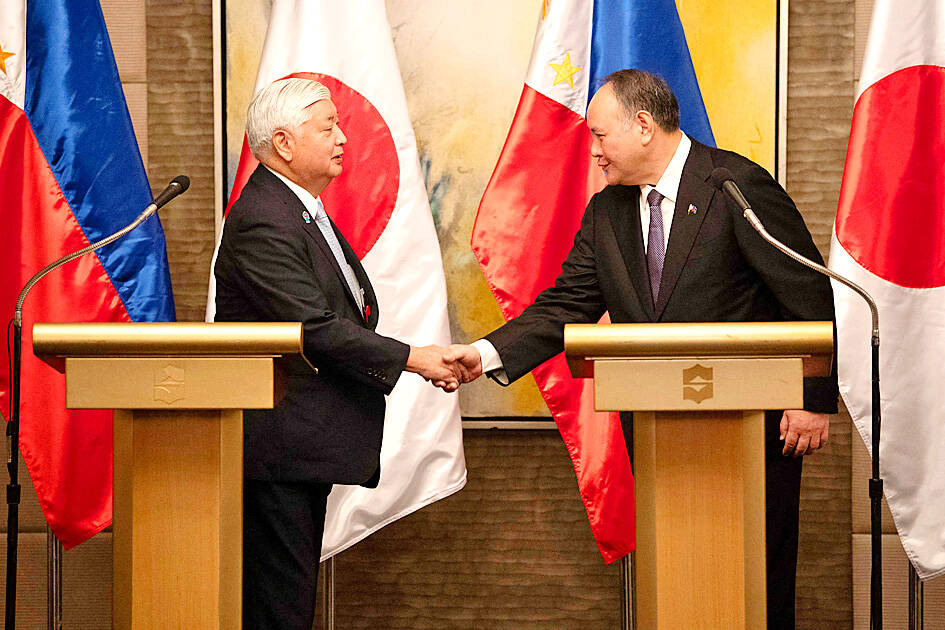An “increasingly severe” security environment has made deepening security ties with the Philippines a necessity, the Japanese defense minister said yesterday after a meeting with his counterpart in Manila.
Speaking as he concluded a two-day visit that included a tour of Philippine air bases, Japanese Minister of Defense Gen Nakatani said the two nations hoped to achieve greater operational collaboration.
“[Philippine] Secretary [of National Defense Gilberto] Teodoro Jr and I firmly concurred that the security environment surrounding us is becoming increasingly severe and it is ... necessary to further enhance defense cooperation,” Nakatani said.

Photo: AFP
He said that the nations had agreed to establish “strategic dialogue between high-level operational officers.”
Nakatani’s visit comes on the heels of a foreign ministers’ meeting last month where the Philippines and Japan vowed to strengthen security cooperation to counter China’s actions in key sea trade routes, including the disputed South China Sea.
Teodoro told yesterday’s joint news conference that the two nations shared the “common cause of resisting any unilateral attempt to reshape ... international law by force.”
China has deployed navy and coast guard vessels in a bid to bar the Philippines from strategically important reefs and islands in the South China Sea, leading to a string of confrontations.
The Philippines in December last year said that a China Coast Guard vessel used water cannon and “sideswiped” a government fisheries department vessel, and last week the Philippine Coast Guard said a Chinese navy helicopter came “within 10 feet” (3m) of a surveillance plane carrying journalists over the contested Scarborough Shoal (Huangyan Island, 黃岩島).
Japan is a key financier of Philippine efforts to modernize its South China Sea patrol craft, as well as maritime surveillance systems including radar installations.
Beijing claims the strategic waterway in almost its entirety despite an international tribunal ruling that its claim lacked any legal basis.
Both Tokyo and Manila are allies of the US, which has been strengthening an arc of alliances to deter China’s claims in the Pacific Ocean.
The Philippine Senate late last year ratified a key pact with Japan that would allow them to deploy troops on each other’s soil. The agreement, which now awaits ratification in Tokyo, also allows for increased joint combat drills.

Right-wing political scientist Laura Fernandez on Sunday won Costa Rica’s presidential election by a landslide, after promising to crack down on rising violence linked to the cocaine trade. Fernandez’s nearest rival, economist Alvaro Ramos, conceded defeat as results showed the ruling party far exceeding the threshold of 40 percent needed to avoid a runoff. With 94 percent of polling stations counted, the political heir of outgoing Costa Rican President Rodrigo Chaves had captured 48.3 percent of the vote compared with Ramos’ 33.4 percent, the Supreme Electoral Tribunal said. As soon as the first results were announced, members of Fernandez’s Sovereign People’s Party

MORE RESPONSIBILITY: Draftees would be expected to fight alongside professional soldiers, likely requiring the transformation of some training brigades into combat units The armed forces are to start incorporating new conscripts into combined arms brigades this year to enhance combat readiness, the Executive Yuan’s latest policy report said. The new policy would affect Taiwanese men entering the military for their compulsory service, which was extended to one year under reforms by then-president Tsai Ing-wen (蔡英文) in 2022. The conscripts would be trained to operate machine guns, uncrewed aerial vehicles, anti-tank guided missile launchers and Stinger air defense systems, the report said, adding that the basic training would be lengthened to eight weeks. After basic training, conscripts would be sorted into infantry battalions that would take

GROWING AMBITIONS: The scale and tempo of the operations show that the Strait has become the core theater for China to expand its security interests, the report said Chinese military aircraft incursions around Taiwan have surged nearly 15-fold over the past five years, according to a report released yesterday by the Democratic Progressive Party’s (DPP) Department of China Affairs. Sorties in the Taiwan Strait were previously irregular, totaling 380 in 2020, but have since evolved into routine operations, the report showed. “This demonstrates that the Taiwan Strait has become both the starting point and testing ground for Beijing’s expansionist ambitions,” it said. Driven by military expansionism, China is systematically pursuing actions aimed at altering the regional “status quo,” the department said, adding that Taiwan represents the most critical link in China’s

EMERGING FIELDS: The Chinese president said that the two countries would explore cooperation in green technology, the digital economy and artificial intelligence Chinese President Xi Jinping (習近平) yesterday called for an “equal and orderly multipolar world” in the face of “unilateral bullying,” in an apparent jab at the US. Xi was speaking during talks in Beijing with Uruguayan President Yamandu Orsi, the first South American leader to visit China since US special forces captured then-Venezuelan president Nicolas Maduro last month — an operation that Beijing condemned as a violation of sovereignty. Orsi follows a slew of leaders to have visited China seeking to boost ties with the world’s second-largest economy to hedge against US President Donald Trump’s increasingly unpredictable administration. “The international situation is fraught